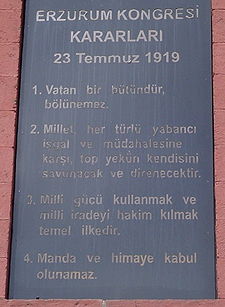- Erzurum Congress
-
The major resolutions of the Erzurum Congress. 1) The unity and integrity of the fatherland are in danger; the mother-land is undivided 2) By no means nobody will emigrate from the region; the minorities' destructive and dividing deeds will not be permitted. 3) Every kind of national struggle is going to be fulfill to protect the independence and integrity of the mother-land. 4) Mandate and protection are not acceptable.

Erzurum Congress (Turkish: Erzurum Kongresi) was an assembly of Turkish Revolutionaries held from 23 July to 4 August 1919 in the city of Erzurum, in eastern Turkey, in accordance with the previously issued Amasya Circular. The congress united delegates from six eastern provinces (vilayet) of the Ottoman Empire, many parts of which were under Allied occupation at the time.[1]
Contents
Proceedings
Fifty-six delegates from the vilayets of Diarbekir, Bitlis, Erzurum, Sivas, Trabzon and Van gathered in Erzurum for the congress held under the auspices of Mustafa Kemal Pasha and Kazım Karabekir Pasha and took a number of initial but important decisions that were to shape the future conduct of the Turkish War of Independence. Namely, it reaffirmed the provinces' desire to remain within the Ottoman Empire (rather than be partitioned by the Allies); refused to accept any mandate scheme for the empire nor accord Christian elements such as Greeks or Armenians with any special privileges; and resolved to resist any such measures, should they try to be implemented.[2],[3] Before dispersing, the congress elected members for a "representative committee" (heyet-i temsiliye), with Kemal as its head.[4]
The conference was held in the building which once housed the Sanasarian Academy, a prestigious school and erstwhile regional center of Armenian culture and education in the years preceding the Armenian Genocide.[5]
Resolutions
The language of the resolutions was as follows:[6][7]:
- The territorial integrity and indivisibility of the homeland ((Manifesto Art. 6: section regarding Regulations Article 3, Article i of the Regulations and the Manifesto)
- The nation would resist foreign occupation and inference.(Articles 2 and 3 of the Regulations ; Articles 3 of the Manifesto.)
- A provisional government would be formed if the government in Istanbul is incapable of maintaining the nation's independence and unity. (Regulations Article 4; Manifesto Article 4.)
- The aim is to consolidate the national forces into a ruling factor and to establish the will of the nation as the sovereign power. (Article 3 of the Manifesto.)
- The nation shall not accept the status of a mandate or a protectorate. (Manifesto Article 7.)
Notes
- ^ Hovannisian, Richard G. (1971). The Republic of Armenia: The First Year, 1918-1919, Vol. I. Berkeley: University of California Press. pp. 434–437. ISBN 0-5200-1984-9.
- ^ Hovannisian. Republic of Armenia, p. 436.
- ^ "Erzurum Kongresi Kararları (23 Temmuz - 7 Ağustos 1919)"http://www.kultur.gov.tr/TR/belge/1-24086/erzurum-kongresi-kararlari-23-temmuz---7-agustos-1919.html
- ^ Zürcher, Eric J. Turkey: A Modern History, 3rd. Ed. London: I.B. Tauris, 2004, p. 150.
- ^ Hovannisian. Republic of Armenia, pp. 435-436.
- ^ (Turkish) M. Fahrettin Kırzıoğlu, Bütünüyle Erzurum Kongresi, 1993, p. 131.
- ^ Ekmeleddin İhsanoğlu, History of the Ottoman state, society & civilisation, 2001, p. 827
See also
- Turkish revolutionaries
- Turkish national movement
- Turkish War of Independence
- Establishment of the Turkish national movement
- Chronology of the Turkish War of Independence
- Amasya Circular
- Sivas Congress
Turkish War of Independence Concepts Local congresses Amasya Circular · Erzurum Congress · Balıkesir Congress · Alaşehir Congress · Sivas Congress · Amasya Protocol · Grand National AssemblyIssues Campaigns RevoltsArmenianGreekSmyrna, 1919 (Occupation) · Aydın · 1st İnönü · 2nd İnönü · Eskişehir · Sakarya · Dumlupinar · Smyrna, 1922 · Fire of SmyrnaAgreements Categories:- Turkish War of Independence
- History of Erzurum
- 1919 in Turkey
Wikimedia Foundation. 2010.

